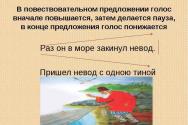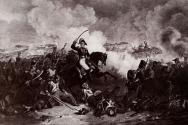Views of representatives of the present century and the past century. "The present century and the past" (the main conflict in the comedy "Woe from Wit")
"The present century and the past" (the main conflict in the comedy "Woe from Wit")
The comedy of Alexander Sergeevich Griboyedov became innovative in Russian literature of the first quarter of the 19th century.
Classic comedy was characterized by the division of heroes into positive and negative. Victory was always for positive heroes, while the negative ones were ridiculed and defeated. In Griboyedov's comedy, the characters are distributed in a completely different way. The main conflict of the play is connected with the division of the heroes into representatives of the “present century” and the “past century”, and the first includes almost only Alexander Andreevich Chatsky, moreover, he often finds himself in a funny position, although he is a positive hero. At the same time, his main “opponent” Famusov is by no means some notorious scoundrel; on the contrary, he is a caring father and a good-natured person.
It is interesting that Chatsky spent his childhood in the house of Pavel Afanasyevich Famusov. Moscow lordly life was measured and calm. Every day was the same. Balls, lunches, dinners, christenings...
He made a match - he succeeded, but he missed.
All the same sense, and the same poems in the albums.
Women are mainly concerned with their outfits. They love everything foreign and French. The ladies of Famus society have one goal - to marry or give their daughters to an influential and rich man. With all this, as Famusov himself puts it, women “are judges of everything, everywhere, there are no judges over them.” Everyone goes to a certain Tatyana Yuryevna for patronage, because “officials and officials are all her friends and all her relatives.” Princess Marya Alekseevna has such weight in high society that Famusov somehow exclaims in fear:
Oh! My God! What will he say?
Princess Marya Aleksevna!
What about men? They are all busy trying to move up the social ladder as much as possible. Here is the thoughtless martinet Skalozub, who measures everything by military standards, jokes in a military way, being an example of stupidity and narrow-mindedness. But this just means a good growth prospect. He has one goal - “to become a general.” Here is the petty official Molchalin. He says, not without pleasure, that he “received three awards, is listed in the Archives,” and he, of course, wants to “reach the well-known levels.”
The Moscow “ace” Famusov himself tells young people about the nobleman Maxim Petrovich, who served under Catherine and, seeking a place at court, showed neither business qualities nor talents, but became famous only for the fact that his neck often “bent” in bows. But “he had a hundred people at his service,” “all wearing orders.” This is the ideal of Famus society.
Moscow nobles are arrogant and arrogant. They treat people poorer than themselves with contempt. But special arrogance can be heard in remarks addressed to the serfs. They are “parsleys”, “crowbars”, “blocks”, “lazy grouse”. One conversation with them: “Get you to work! Get you settled!” In close formation, the Famusites oppose everything new and advanced. They can be liberal, but they are afraid of fundamental changes like fire. There is so much hatred in Famusov’s words:
Learning is the plague, learning is the reason,
What is worse now than before,
There were crazy people, deeds, and opinions.
Thus, Chatsky is well acquainted with the spirit of the “past century,” marked by servility, hatred of enlightenment, and the emptiness of life. All this early aroused boredom and disgust in our hero. Despite his friendship with sweet Sophia, Chatsky leaves the house of his relatives and begins an independent life.
“The desire to wander attacked him...” His soul thirsted for novelty modern ideas, communication with the leading people of the time. He leaves Moscow and goes to St. Petersburg. “High thoughts” are above all for him. It was in St. Petersburg that Chatsky’s views and aspirations took shape. He apparently became interested in literature. Even Famusov heard rumors that Chatsky “writes and translates well.” At the same time, Chatsky is fascinated by social activity. He develops a “connection with the ministers.” However, not for long. High concepts of honor do not allow him to serve; he wanted to serve the cause, not individuals.
After this, Chatsky probably visited the village, where, according to Famusov, he “made a mistake” by mistakenly managing the estate. Then our hero goes abroad. At that time, “travel” was looked at askance, as a manifestation of the liberal spirit. But it was precisely the acquaintance of representatives of the Russian noble youth with the life, philosophy, and history of Western Europe that had great importance for their development.
And now we meet the mature Chatsky, a man with established ideas. Chatsky contrasts the slave morality of Famus society with a high understanding of honor and duty. He passionately denounces the one he hates serfdom. He cannot calmly talk about “Nestor of the noble scoundrels,” who exchanges servants for dogs, or about the one who “drove to the serf ballet... from mothers, fathers of rejected children” and, having gone bankrupt, sold them all one by one.
These are the ones who lived to see their gray hairs!
This is who we should respect in the wilderness!
Here are our strict connoisseurs and judges!
Chatsky hates “the meanest traits of the past,” people who “draw judgments from forgotten newspapers from the times of the Ochakovskys and the conquest of the Crimea.” His sharp protest is caused by his noble servility to everything foreign, his French upbringing, common in the lordly environment. In his famous monologue about the “Frenchman from Bordeaux,” he talks about the ardent attachment of the common people to their homeland, national customs and language.
As a true educator, Chatsky passionately defends the rights of reason and deeply believes in its power. In reason, in education, in public opinion, in the power of ideological and moral influence, he sees the main and powerful means of remaking society and changing life. He defends the right to serve education and science:
Now let one of us
Among the young people there will be an enemy of quest,
Without demanding either places or promotion,
He will focus his mind on science, thirsting for knowledge;
Or God himself will stir up heat in his soul
To the creative, high and beautiful arts, -
They immediately: robbery! Fire!
He will be known among them as a dreamer! Dangerous!!!
Among such young people in the play, in addition to Chatsky, one can also include, perhaps, Skalozub’s cousin, the nephew of Princess Tugoukhovskaya - “a chemist and a botanist.” But the play talks about them in passing. Among Famusov's guests, our hero is a loner.
Of course, Chatsky makes enemies for himself. Well, will Skalozub forgive him if he hears about himself: “Khripun, strangled, bassoon, constellation of maneuvers and mazurkas!” Or Natalya Dmitrievna, whom he advised to live in the village? Or Khlestova, at whom Chatsky openly laughs? But, of course, Molchalin gets the most. Chatsky considers him a “most pitiful creature”, like all fools. Out of revenge for such words, Sophia declares Chatsky crazy. Everyone happily picks up this news, they sincerely believe in the gossip, because, indeed, in this society he seems crazy.
A.S. Pushkin, having read “Woe from Wit,” noticed that Chatsky was throwing pearls before swine, that he would never convince those to whom he addressed with his angry, passionate monologues. And one cannot but agree with this. But Chatsky is young. Yes, he has no goal of starting disputes with the older generation. First of all, he wanted to see Sophia, for whom he had a heartfelt affection since childhood. Another thing is that during the time that has passed since their last meeting, Sophia has changed. Chatsky is discouraged by her cold reception, he is trying to understand how it could happen that she no longer needs him. Perhaps it was this mental trauma that triggered the conflict mechanism.
As a result, there is a complete break between Chatsky and the world in which he spent his childhood and with which he is connected by blood ties. But the conflict that led to this break is not personal, not accidental. This conflict is social. We didn't just collide different people, but different worldviews, different public positions. The external outbreak of the conflict was Chatsky’s arrival at Famusov’s house; it was developed in disputes and monologues of the main characters (“Who are the judges?”, “That’s it, you are all proud!”). Growing misunderstanding and alienation lead to a climax: at the ball, Chatsky is declared insane. And then he himself understands that all his words and emotional movements were in vain:
You all glorified me as crazy.
You are right: he will come out of the fire unharmed,
Who will have time to spend a day with you,
Breathe the air alone
And his sanity will survive.
The outcome of the conflict is Chatsky’s departure from Moscow. The relationship between Famus society and the main character is clarified to the end: they deeply despise each other and do not want to have anything in common. It's impossible to tell who has the upper hand. After all, the conflict between old and new is as eternal as the world. And the theme of the suffering of the smart, educated person in Russia it is still topical today. To this day, people suffer more from their intelligence than from their absence. In this sense, Griboyedov created a comedy for all times.
- The comedy by A. S. Griboyedov “Woe from Wit” reflected with amazing accuracy the main conflict of the era - the clash of conservative forces of society with new people and new trends. For the first time in the history of Russian literature, not one vice of society was ridiculed, but all at once: serfdom, emerging bureaucracy, careerism, sycophancy, martinetry, low level education, admiration for everything foreign, servility, the fact that in society it is not the personal qualities of a person that are valued, but “the souls of two thousand clans,” rank, money.
- The main representative of the “present century” in comedy is Alexander Andreevich Chatsky - a young man, well educated, who realized that although the “smoke of the Fatherland” is “sweet and pleasant,” much in the life of Russia needs to be changed, and, first of all, the consciousness of people.
- The hero is opposed by the so-called “Famus society”, which is dominated by fear of progressive ideas and free-thinking thoughts. Its main representative, Famusov, is an official, a smart person in everyday life, but an ardent opponent of everything new and progressive.
|
Characteristics |
This century |
The past century |
|
Attitude to wealth, to ranks |
“They found protection from the court in friends, in kinship, in building magnificent chambers where they indulge in feasts and extravagance, and where the foreign clients of their past lives do not resurrect the meanest traits,” “And for those who are higher, flattery, like weaving lace...” |
“Be poor, but if you get enough, two thousand family souls, that’s the groom” |
|
Attitude to service |
“I’d be glad to serve, it’s sickening to be served”, “Uniform! one uniform! In their former life, he once covered, embroidered and beautiful, their weakness, their poverty of mind; And we follow them on a happy journey! And in wives and daughters there is the same passion for the uniform! How long ago did I renounce tenderness towards him?! Now I can’t fall into this childish behavior...” |
“And for me, no matter what’s the matter, what’s not the matter, my custom is this: it’s signed, then off your shoulders.” |
|
Attitude towards foreign |
“And where foreign clients will not resurrect the meanest traits of their past lives.” “As from an early time we were accustomed to believe that without the Germans there was no salvation for us.” |
“The door is open for those invited and uninvited, especially for foreigners.” |
|
Attitude towards education |
“What, now, just like in ancient times, are they bothering to recruit more teachers from regiments, at a cheaper price? ... we are ordered to recognize everyone as a historian and geographer.” |
“They would take all the books and burn them,” “Learning is a plague, learning is the reason that now, more than ever, there are more crazy people, deeds, and opinions.” |
|
Attitude to serfdom |
“That Nestor is a noble scoundrel, surrounded by a crowd of servants; zealous, they saved his honor and life more than once in the hours of wine and fights: suddenly, he exchanged three greyhounds for them!!!” |
Famusov is a defender of the old century, the heyday of serfdom. |
|
Attitude to Moscow morals and pastimes |
“And who in Moscow hasn’t had their mouths gagged at lunch, dinner and dance?” |
“I’m called to Praskovya Fedorovna’s house on Tuesday for trout,” “On Thursday I’m called to a funeral,” “Or maybe on Friday, or maybe on Saturday, I have to baptize at the widow’s, at the doctor’s.” |
|
Attitude to nepotism, patronage |
“And who are the judges? - Over the centuries of free life, their enmity is irreconcilable...” |
“When I have employees, strangers are very rare, more and more sisters, sisters-in-law and children.” |
|
Attitude to freedom of judgment |
“For mercy, you and I are not guys, why are other people’s opinions only sacred?” |
Learning is the plague, learning is the cause. What is worse now than before, crazy people and affairs and opinions |
|
Attitude towards love |
Sincerity of feeling |
“Be bad, but if there are two thousand family souls, that’s the groom.” |
|
Chatsky’s ideal is a free, independent person, alien to slavish humiliation. |
Famusov’s ideal is a nobleman of the Catherine century, “hunters of indecency” |
In his comedy, Griboyedov deliberately collides the “present century” and the “past century.” For what? In order to expose the problems of both centuries. But there are many problems in Russia - serfdom, upbringing and education of youth, promotion to ranks. The present century is represented by the young nobleman Chatsky, who was educated in Europe. He wants to apply the acquired knowledge in Russia. But, alas, Russia lives in the past century with its terrible, ugly plague - serfdom. The past century is represented by conservative feudal lords led by Famusov. They are not going to give up their positions without a fight. And so the swords of a verbal duel crossed, only sparks fly.
The first round is the attitude towards wealth and rank. Young people are ready and want to serve Russia. “I would be glad to serve, but being served is sickening.” This is Chatsky's slogan. What can Famusov offer in response? Hereditary service. His ideal is the dense uncle Maxim Petrovich (and where did he find him)? He served under Catherine the Great, and it doesn’t matter that he was a stupid buffoon.
Round two - attitude to education issues. Famusov's attack - education is not needed, it is scary, like the plague. Educated people dangerous and scary. But following the fashion, they hire foreign teachers. Chatsky counters - he sees Russia as educated, enlightened, cultural. Somewhat reminiscent of the ideas of the early Decembrists.
Round three - attitude towards serfdom. Chatsky is indignant - he does not understand how people sell people like cattle, change them, play cards with them, separate families, send them to distant cold Siberia. For Famusov, this is common practice.
“The Past Century,” as is often customary in Russia, fights not according to the rules, not fairly. If you lose to your opponent, you need to neutralize him for a while and take him out of the game. Everything is simple and tastefully made by the hands of a once beloved woman. So as not to interfere with her and others living in the old way, she publicly slandered Chatsky, saying that he was mentally ill. It’s good that he’s not violently insane, otherwise he’d be completely isolated from society. And what to take from a sick person? He doesn't know what he's saying.
In fact, there is no one to support Chatsky. He has no comrades-in-arms, and he alone cannot cope with Famusov and others like him. The play mentions people who, from the point of view of the Famus company, are strange. This is Skalozub's cousin, reading books in the village. Yes, Prince Fedor, to whom the label “chemist and botanist” was firmly stuck. What is funny and shameful about this is not clear. Repetilov confidentially reports that he is a member of some society. Nobody knows what they are doing there. “We make noise,” as Repetilov himself puts it about his activities.
Humiliated, insulted, but not defeated, Chatsky has no choice but to leave this city and the people who slandered and rejected him.
Option 2
The story was completed by 1824. At this time, disagreements over views were growing between people in different strata of society. Literally a year later, the Decembrists rebelled and this happened approximately because of an emerging problem. Those who supported everything new, reforms, changes in both politics and literature stood against conservative relatives.
Chatsky was approximately as liberal-minded as he was, literally personifying youth, ardor and the desire for change. And Famusov, like all older people, was inclined to believe that “it was better before,” and therefore he advocated preserving this “before.” When Chatsky had to return to the capital, the first thing that caught his eye was that Sophia began to speak just like her father. The words of his beloved hurt, but the young man understood the power of propaganda that fell in powerful waves on Sophia from her father.
Actually, the first clash between the “past century” and the “present” occurred on the basis of military service. For Famusov, service is only a way to earn money. What is noteworthy: earning money at any cost. He doesn’t care that sometimes he has to accommodate higher ranks, but Chatsky has a different attitude. Having succinctly and a little rudely said the phrase “I would be glad to serve, it’s sickening to be served,” he clearly explained his position. He literally has an aversion to the blind worship of foreign things, veneration of rank, and serfdom, which are so dear to the Famus circle.
Famusov's friends, in turn, consider Sophia's lover to be an extravagant, insane, sloppy dandy in his actions and words. And now, you can imagine how difficult it was for Sophia: on the one hand, her father promotes foreign writers and everything else, and on the other, the young man talks about the uselessness of foreign teachers.
Thus, through the mouth of Chatsky, Griboedov himself spoke to the people about the need for change. He tried in vain to convey that everything that exists in Russia is already good, that they have their own teachers, much better than foreign ones. And creativity... Griboyedov decided to prove by his own example that creativity is better in Russia.
Several interesting essays
- Moral choice in Bulgakov's novel The Master and Margarita essay
A story that is connected with the devil is practically (this word is used here only in order not to exclude the unlikely possibility of other relationships, but, in fact, other options here
- Essay The Meaning of Names in the Novel Crime and Punishment by Dostoevsky
This work of Dostoevsky is simply replete with various symbols. Portraits and landscapes, names and surnames of heroes, things, all these are symbols.
- Essay Wild Landowner based on the fairy tale by Saltykov-Shchedrin
In his work M. Saltykov-Shchedrin Special attention devoted to fairy tales that were intended exclusively for an adult audience. In them, with a fair amount of humor and irony, he ridiculed the relationship between landowners
- The image and characteristics of Derzhimorda in Gogol's comedy The Inspector General essay
The Derzhimord policeman, along with other numerous heroes, is one of minor characters works.
- Analysis of the novel Anna Karenina by Tolstoy
“Anna Karenina” - novel by L.N. Tolstoy, which today does not lose its relevance due to the fact that the work touched upon such eternal themes like love, passion, betrayal, sacrifice and condemnation of society
The comedy “Woe from Wit” by A.S. Griboyedov was written in the first half of the 19th century and is a satire on the views noble society that time. In the play, two opposing camps collide: the conservative nobility and the younger generation of nobles who have new views on the structure of society. Main character“Woe from Wit” Alexander Andreevich Chatsky aptly called the disputing parties “the present century” and “the past century.” The generational dispute is also presented in the comedy “Woe from Wit”. What each side represents, what their views and ideals are, will help you understand the analysis of “Woe from Wit.”
The “past century” in comedy is much more numerous than the camp of its opponents. The main representative of the conservative nobility is Pavel Afanasyevich Famusov, in whose house all the phenomena of comedy take place. He is a manager in a government house. His daughter Sophia was raised by him from childhood, because... her mother died. Their relationship reflects the conflict between fathers and sons in Woe from Wit.
In the first act, Famusov finds Sophia in a room with Molchalin, his secretary, who lives in their house. He doesn’t like his daughter’s behavior, and Famusov begins to read morals to her. His views on education reflect the position of the entire noble class: “We were given these languages! We take tramps, both into the house and on tickets, so that we can teach our daughters everything.” There are minimum requirements for foreign teachers, the main thing is that there should be “more in number, at a cheaper price.”
However, Famusov believes that the best educational influence on a daughter should be the example of her own father. In this regard, in the play “Woe from Wit” the problem of fathers and children becomes even more acute. Famusov says about himself that he is “known for his monastic behavior.” But is he like that? good example for imitation, if a second before he began to moralize Sophia, the reader watched him openly flirt with the maid Lisa? For Famusov, the only thing that matters is what people say about him in the world. And if noble society does not gossip about his love affairs, it means his conscience is clear. Even Liza, imbued with the morals reigning in Famusov’s house, warns her young mistress not against nightly meetings with Molchalin, but against public gossip: “Sin is not a problem, rumor is not good.” This position characterizes Famusov as a morally corrupt person. Does an immoral person have the right to talk about morality in front of his daughter, and even be considered an example for her?
In this regard, the conclusion suggests itself that for Famusov (and in his person for the entire Old Moscow noble society) it is more important to seem like a worthy person, and not to be one. Moreover, the desire of representatives of the “past century” to make a good impression extends only to rich and noble people, because communication with them contributes to the acquisition of personal gain. People who do not have high titles, awards and wealth receive only contempt from the noble society: “Whoever needs it: those who are in need, they lie in the dust, and for those who are higher, flattery is woven like lace.”
Famusov transfers this principle of dealing with people to his attitude towards family life. “Whoever is poor is not a match for you,” he tells his daughter. The feeling of love has no power; it is despised by this society. Calculation and profit dominate the life of Famusov and his supporters: “Be inferior, but if there are two thousand family souls, that’s the groom.” This position creates a lack of freedom for these people. They are hostages and slaves of their own comfort: “And who in Moscow hasn’t had their mouths gagged at lunches, dinners and dances?”
What is humiliation for progressive people of the new generation is the norm of life for representatives of the conservative nobility. And this is no longer just a generational dispute in the work “Woe from Wit,” but a much deeper divergence in the views of the two opposing sides. With great admiration, Famusov recalls his uncle Maxim Petrovich, who “knew honor before everyone,” had “a hundred people at his service,” and was “all decorated.” What did he do to deserve his high position in society? Once, at a reception with the Empress, he stumbled and fell, painfully hitting the back of his head. Seeing the smile on the face of the autocrat, Maxim Petrovich decided to repeat his fall several more times in order to amuse the empress and the court. Such an ability to “help oneself,” according to Famusov, is worthy of respect, and the younger generation should take an example from him.
Famusov envisions Colonel Skalozub as his daughter’s groom, who “will never utter a smart word.” He is good only because “he has picked up a ton of marks of distinction,” but Famusov, “like all Moscow people,” “would like a son-in-law... with stars and ranks.”
The younger generation in a society of conservative nobility. Image of Molchalin.
The conflict between the “present century” and the “past century” is not defined or limited in the comedy “Woe from Wit” to the theme of fathers and children. For example, Molchalin, belonging to the younger generation by age, adheres to the views of the “past century.” In the first appearances, he appears before the reader as Sophia’s modest lover. But he, like Famusov, is very afraid that society might have a bad opinion about him: “Evil tongues are worse than a pistol.” As the action of the play develops, Molchalin's true face is revealed. It turns out that he is with Sophia “out of position,” that is, in order to please her father. In fact, he is more passionate about the maid Liza, with whom he behaves much more relaxed than with Famusov’s daughter. Beneath Molchalin's taciturnity lies his duplicity. He does not miss the opportunity at a party to show his helpfulness in front of influential guests, because “you have to depend on others.” This young man lives according to the rules of the “past century”, and therefore “Silent people are blissful in the world.”
“The Present Century” in the play “Woe from Wit.” The image of Chatsky.
The only defender of other views on the problems raised in the work, a representative of the “present century,” is Chatsky. He was brought up together with Sophia, there was youthful love between them, which the hero keeps in his heart even at the time of the events of the play. Chatsky has not been to Famusov’s house for three years, because... traveled around the world. Now he has returned with hopes of Sophia's mutual love. But here everything has changed. His beloved greets him coldly, and his views are fundamentally at odds with the views of Famus society.
In response to Famusov’s call “go and serve!” Chatsky replies that he is ready to serve, but only “to the cause, not to individuals,” but he is generally “sickened” to “serve.” In the “past century” Chatsky does not see freedom for the human person. He does not want to be a buffoon for a society where “he was famous whose neck was more often bent,” where a person is judged not by his personal qualities, but by the material wealth he possesses. Indeed, how can one judge a person only by his ranks, if “ranks are given by people, but people can be deceived”? Chatsky sees enemies of free life in Famus society and does not find role models in it. The main character, in his accusatory monologues addressed to Famusov and his supporters, speaks out against serfdom, against the slavish love of the Russian people for everything foreign, against servility and careerism. Chatsky is a supporter of enlightenment, a creative and seeking mind, capable of acting in accordance with conscience.
The “present century” is inferior in number to the “past century” in the play. This is the only reason why Chatsky is doomed to defeat in this battle. It’s just that the Chatskys’ time hasn’t come yet. A split among the nobility has only just begun, but in the future the progressive views of the protagonist of the comedy “Woe from Wit” will bear fruit. Now Chatsky has been declared crazy, because the accusatory speeches of a madman are not scary. The conservative nobility, by supporting the rumor of Chatsky's madness, only temporarily protected themselves from the changes that they are so afraid of, but which are inevitable.
conclusions
Thus, in the comedy “Woe from Wit” the problem of generations is not the main one and does not reveal the full depth of the conflict between the “present century” and the “past century”. The contradictions between the two camps lie in the difference in their perception of life and the structure of society, in in different ways interaction with this society. This conflict cannot be resolved by verbal battles. Only time and a series of historical events will naturally replace the old with the new.
Conducted comparative analysis two generations will help 9th grade students describe the conflict of the “present century” with the “past century” in their essay on the topic ““The present century” and the “past century” in the comedy “Woe from Wit” by Griboyedov”
Work test
Plan:
1. Introduction
a) representatives of the “past century”;
b) representatives of the “present century”.
2. Main part:
a) Chatsky’s point of view;
b) Famusov’s point of view;
c) conflict resolution.
3. Conclusion.
In the comedy “Woe from Wit” by A.S. Griboedov shows the conflict of the “present century” represented by Chatsky and the “past century” represented by the “Famusov society”. This main conflict, to whom the entire play is dedicated; No wonder Goncharov critical article“A Million Torments” writes that “Chatsky begins new Age- and this is his whole meaning and his whole “mind”. Thus, even the title of the work indicates that, first of all, Griboedov wanted to show the collision of two centuries.
“The Past Century” is, of course, the Famusovs. Pavel Afanasyevich Famusov, an elderly nobleman and official with money, and his daughter, Sofia Pavlovna Famusova, an educated and pretty young girl. This should also include Molchalin, Colonel Skalozub, as well as almost all the minor characters of the comedy: the Tugoukhovsky couple, Mrs. Khlestova and others. All together they form the “Famus society”, the personification of the “past century”.
“The Present Century” - Alexander Andreevich Chatsky. Others are fleetingly mentioned, as if heroes similar in thinking to him: Skalozub’s cousin, Prince Fyodor - these young people also strive to live a different life, different from the life of “Famus society”. However, there is a significant difference between them and Chatsky: Chatsky is an accuser and an irreconcilable fighter, while these characters do not impose their point of view on anyone.
The collision between Famusov and Chatsky inevitably leads to a collision of the centuries to which they belong. According to Pavel Afanasyevich, Chatsky should take up service - Famusov sees in young man good makings for a brilliant career, besides, Alexander Andreevich is the son of his friend, so Famusov is extremely friendly towards him. Chatsky is also glad to return home, not yet knowing how this return will end; he is glad to see Famusov, but is not ready to share his views: “I would be glad to serve, but it’s sickening to be served.”
A young nobleman, after traveling around Europe, sees all too clearly all the frightening flaws of the Motherland: destructive for human souls serfdom, imitation of foreigners, “meanness,” stupid and absurd “love of uniform”... each of these flaws raises a sincere protest in him, and Chatsky breaks out into another fiery tirade. His famous monologues “And sure enough, the world has begun to grow stupid”, “I won’t come to my senses...”, “Who are the judges?” - a desperate attempt to make people see what false ideals they follow, how they curtain their windows from the rays of a bright future with their own hands. Famusov is disappointed in Chatsky. “The little one with the head” refuses to follow generally accepted traditions, acts as an exposer and even an insult to the values of “Famus society.” “Everything has its own laws,” and Chatsky diligently violates these laws, and then mocks them.
Of course, a worthy representative of Moscow society cannot tolerate this, and every now and then asks Chatsky to remain silent for his own good. Oddly enough, the most terrible, decisive clash does not occur between Pavel Afansevich and Chatsky. Yes, they are developing the conflict of centuries, demonstrating different views on the order in society, but it is not Famusov who will put an end to the conflict, but his daughter. Sofia, passionately beloved by Chatsky to the last, not only exchanged him for the helpful, hypocritical Molchalin, but also unwittingly became the culprit of his expulsion - it was because of her that Chatsky began to be considered crazy. Or rather, she just wanted to start a rumor in order to take revenge on him for ridiculing Molchalin, but the “Famus society” too willingly picked it up and believed: after all, the madman is not dangerous, all his accusatory, terrible speeches for the “bygone century” can be attributed to clouding of reason...
So, “the present century” and the “past century” could not help but come into conflict because of too different, contradictory views on the correct structure of society and the behavior of people in it. And although in the comedy Chatsky flees Moscow, admitting his defeat, “ Famusov society" Not long left. Goncharov writes about it this way: “Chatsky is broken by the amount of old strength, inflicting a mortal blow on it in turn with the quality of fresh strength.”








